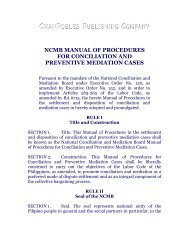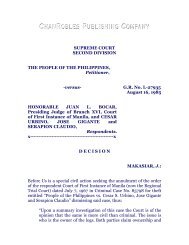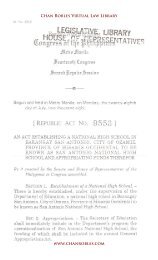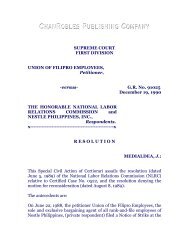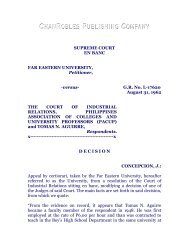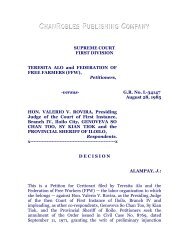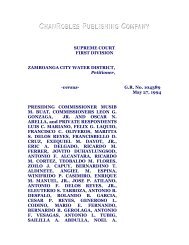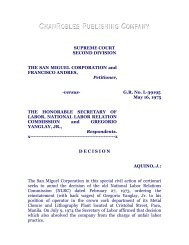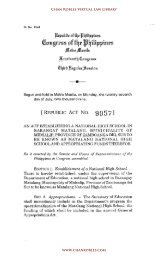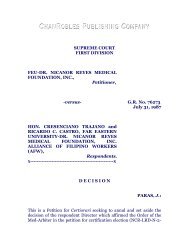J. D. Legaspi Construction vs. NLRC - Chan Robles and Associates ...
J. D. Legaspi Construction vs. NLRC - Chan Robles and Associates ...
J. D. Legaspi Construction vs. NLRC - Chan Robles and Associates ...
You also want an ePaper? Increase the reach of your titles
YUMPU automatically turns print PDFs into web optimized ePapers that Google loves.
At the outset, the Court takes notice of the fact that petitioners<br />
already exhausted all remedies available to them way back September<br />
3, 1997 when this Court dismissed their petition for certiorari<br />
questioning the legality of the <strong>NLRC</strong>’s decision against them. It has<br />
been five years since then <strong>and</strong> petitioners are still brazenly attempting<br />
to delay this case further. They claim to have been denied due process<br />
of law.<br />
We are not convinced.<br />
Denial of due process means the total lack of opportunity to be heard<br />
or to have one’s day in court. There is no denial of due process where<br />
a party has been given an opportunity to be heard <strong>and</strong> to present his<br />
case. [4] chanroblespublishingcompany<br />
In the case at bar, petitioners were represented by counsel during the<br />
hearings conducted by the labor arbiter on April 24, 1995, May 16,<br />
1995 <strong>and</strong> June 25, 1995; they were served with summons; they<br />
received the notices for the hearings conducted on July 19, 1995,<br />
August 2, 1995 <strong>and</strong> August 16, 1995, <strong>and</strong> they received a copy of the<br />
labor arbiter’s decision dated January 2, 1997. chanroblespublishingcompany<br />
Moreover, petitioners filed a series of pleadings <strong>and</strong> motions, an<br />
appeal <strong>and</strong> a motion for reconsideration with the <strong>NLRC</strong> <strong>and</strong> a<br />
petition for certiorari with the Supreme Court. After all these<br />
remedies proved futile, petitioners filed a motion to quash the writ of<br />
execution which dragged the case even more <strong>and</strong> effectively derailed<br />
the execution of an already final <strong>and</strong> executory judgment. The issue of<br />
lack of due process was raised in all of the above-mentioned pleadings<br />
<strong>and</strong> was exhaustively passed upon. Clearly, petitioners were not<br />
denied due process. chanroblespublishingcompany<br />
The Labor Arbiter’s decision has long become final <strong>and</strong> executory <strong>and</strong><br />
it can no longer be reversed or modified.<br />
The Court has on occasion ruled that:<br />
Now, nothing is more settled in law than when a final judgment<br />
becomes executory, it thereby becomes immutable <strong>and</strong><br />
unalterable. The judgment may no longer be modified in any



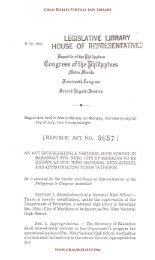
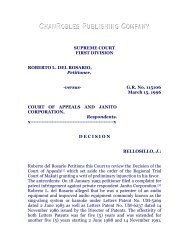
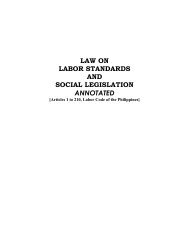
![Aurelio vs. NLRC, (221 SCRA 432 [1993]) - Chan Robles and ...](https://img.yumpu.com/51280528/1/190x245/aurelio-vs-nlrc-221-scra-432-1993-chan-robles-and-.jpg?quality=85)
